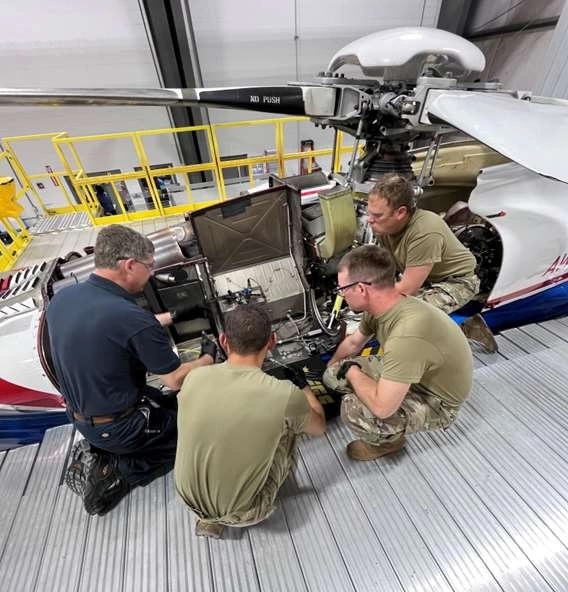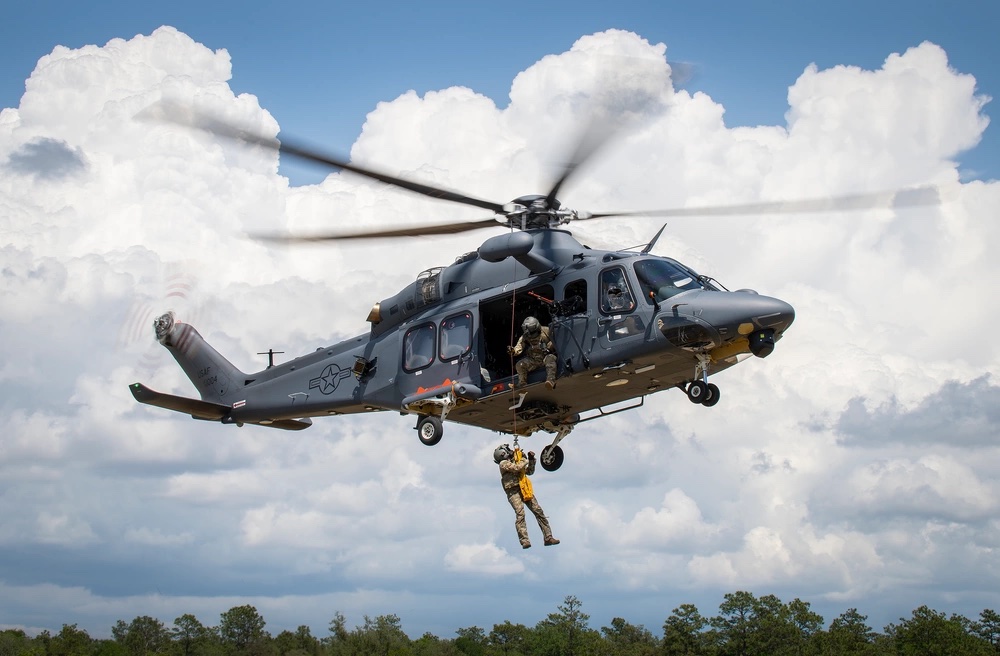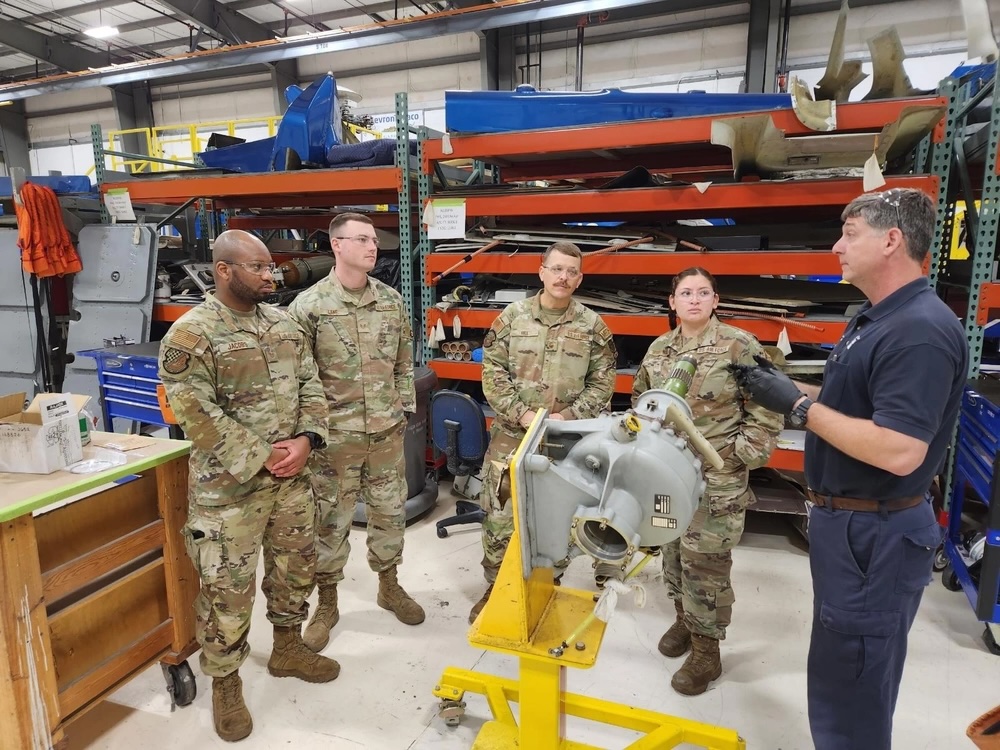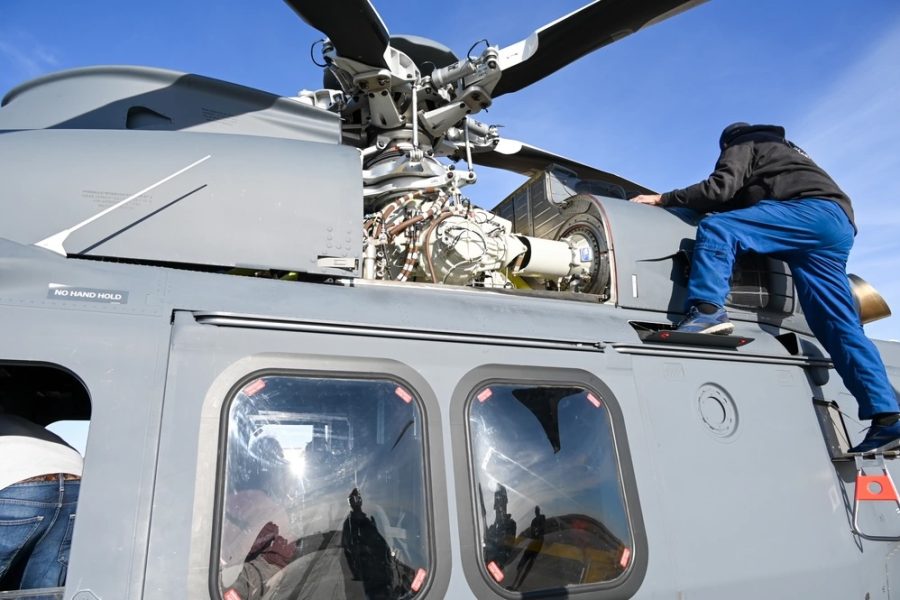A reserve unit in Alabama is training the first generation of uniformed maintainers who will help keep the incoming fleet of MH-139A Grey Wolf helicopters up and running. The 908th Airlift Wing, located at Maxwell Air Force Base, sent Airmen to Picayune, Miss., where civilian mechanics showed the Airmen how they maintain AW139s—the civilian version of the Grey Wolf—which the Chevron Corporation uses to help operate offshore oil rigs in the Gulf of Mexico.
There is currently no training program in the Department of Defense for maintaining the MH-139A, so the 30-day visits to Picayune are a chance for Airmen to learn the tricks of the trade from wrench-turners who work on a very similar aircraft.
“It was extremely beneficial for us to be at their site with them,” Master Sgt. Timothy Hill, 908th Maintenance Squadron dedicated crew chief, said in a Nov. 27 press release about the training. “It gave us an opportunity to see all that they do, and to receive mentorship and build relationships with their maintainers.”
 908th Aircraft Maintenance Squadron mechanical maintainers inspect the engine bay of an AW-139 helicopter prior to the installation of the engine to ensure nothing is broken, damaged, or out of place at the Chevron helicopter maintenance facility in Picayune, Mississippi June 21, 2023. (U.S. Air Force courtesy photo.)
908th Aircraft Maintenance Squadron mechanical maintainers inspect the engine bay of an AW-139 helicopter prior to the installation of the engine to ensure nothing is broken, damaged, or out of place at the Chevron helicopter maintenance facility in Picayune, Mississippi June 21, 2023. (U.S. Air Force courtesy photo.)More than 20 maintainers have visited Picayune since January. Many of them have years of experience working on the C-130 transport plane, which the 908th flew until April 2022. But the Grey Wolf is a different beast.
“The single most valuable thing that I’ve learned is just how vastly different a rotary aircraft is from a fixed wing aircraft that we’re accustomed to working on,” Tech. Sgt. Lloydstone Jacobs, 908th Aircraft Maintenance Squadron mechanical maintainer, said in the release.
All aircraft can have mechanical issues, but helicopters in general are more difficult to maintain than fixed wing airplanes due to their larger number of moving parts. Luckily, the 908th Airmen have a helping hand from their Chevron counterparts.
“It is invaluable,” Hill said. “All the mechanics at Chevron are so smart and experienced on the 139, and by getting the chance to learn from them, it only increases our knowledge for our upcoming mission.”
The maintainers will really hit the books starting in March, when manufacturer Leonardo and military modification contractor Boeing will provide MH-139-specific training at the Leonardo facility in Philadelphia. Known as Type-1 training, the program is estimated to take nine weeks with some additional proficiency training afterwards.

In the meantime, the 908th has also started sending maintainers to Davis-Monthan Air Force Base, Ariz. and Moody Air Force Base, Ga. for basic rotary fundamentals. The Air Force typically sends rotary or tiltrotor maintainers to a six-week introduction course provided by the Army at Fort Eustis, Va., followed by specific training on the HH-60 or CV-22, Brad Clark, a spokesperson for the 908th, told Air & Space Forces Magazine.
The Air Force decided not to create a formal tech school for MH-139 maintainers, since the 908th will be the only group of uniformed Grey Wolf wrench-turners. Though the exact arrangements are still being worked out, the 908th may perform higher-level maintenance similar to a depot, while day-to-day maintenance at MH-139 flying units may be carried out by civilians.
The Grey Wolf will replace the Air Force’s aging UH-1N Huey helicopters, some of which served in the Vietnam War. The Hueys provide security and support to nuclear missile fields in the western U.S., and they also transport government officials around the Washington D.C. area.
The MH-139 is 50 percent faster than the Huey, has a 30 percent larger cabin, and can lift 5,000 pounds more. Boeing delivered the sixth and last test Grey Wolf in October, with the first production aircraft expected in mid-2024. The service plans to procure up to 84 helicopters through fiscal year 2027, with the formal training unit for pilots and enlisted aircrew at Maxwell.

In the meantime, the 908th is busy standing up a range of programs and facilities to prepare for the new mission. It awarded $34 million in construction and renovation contracts for new buildings, sent eight C-130 flight engineers and loadmasters to become special missions aviators (the enlisted aircrew aboard helicopters and tiltrotors), sent C-130 pilots to learn how to fly helicopters, and tapped into 908th Airmen with helicopter experience.
Besides learning a new aircraft, maintainers at the 908th will also learn a new style of maintenance. The previous specialties of crew chief, hydraulics, and engines/propulsion were combined into the career field of mechanical maintainers, while the previous specialties of communication, navigation, electrical, environmental, guidance, and control systems were combined into technical maintainers. The Airmen will work together much more closely with the Grey Wolf than they did on the C-130.
“[T]his is a big mind shift coming from a C-130 where they think ‘this is my field and this is what I focus on,’ to working hand-in-hand with each other; and that rotor doesn’t move without all of these systems,” Master Sgt. Mike Cutter, 908th Aircraft Maintenance Squadron crew chief and expediter, said in a 2022 press release.
The hope is that all these efforts will help the 908th hit the ground running when their Grey Wolves arrive.
“This is beneficial to me as a member because it affords me not only an opportunity to get a head start on the aircraft but to also get myself comfortable working on it,” Jacobs said about the Chevron training.


